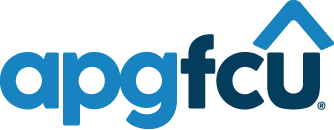- Learning Hub
- Financial Education
- Security
- College Planning and Education Loans
- Benefit Programs
- Financial Resources for Educators
- Insurance
- Financial Wellness in the Community
- Articles & Resource Library
- Financial Calculators
- IRA - Individual Retirement Accounts
- Overdraft Protection Services
- How to Bank Remotely
- Locations
- Aberdeen Branch
- APG Branch
- Bel Air — Amyclae Branch
- Bel Air — Home Loan Center, Main St. (No ATM)
- Bel Air — Laurel Bush Branch
- Bel Air — Main St. Branch
- Cecil College Branch
- Chesapeake City Branch
- Edgewood Branch
- Elkton Branch
- Fallston Branch
- Forest Hill Branch
- Havre de Grace Branch
- North East Branch
- Rising Sun Branch
- Riverside Branch
- Notary Services
Fraud Texts Security Alert
Please be aware that APGFCU will never send you text messages containing links to our website or instructing you to log into online banking. If you receive a text message with a link to APGFCU's website, do not click on it. Instead, visit apgfcu.com or use the mobile app to access your online banking account.


Articles & Resource Library
With a focus on community, APGFCU knows how important it is to share our knowledge for building and protecting wealth. Check out our resource library below, including helpful links, articles and infographics on an array of financial topics.
Additional Resources
Infographics
Financial Education
-

Credit Union Checking Account Perks You Didn't Know About
2025-01-03 | News Financial EducationA checking account is the workhorse of your everyday financial life. Through it, you can make deposits, withdrawals and debit card purchases—all of the typical transactions you make on any given day.
-

How To Join A Credit Union In 5 Steps
2024-10-02 | News Financial EducationCredit unions are unique financial institutions that put the best interests of their members first. Read to learn how to become a credit union member and take advantage of all the features and benefits they have to offer.
-

Why Credit Unions Are Good For Local Communities
2024-05-03 | News Financial EducationCredit unions play a vital role in building strong communities. As member-owned financial cooperatives, they put the needs of their members first and benefit local economies.
-

Banks or Credit Unions: Which Should You Choose?
2024-02-02 | News Financial EducationYou might be familiar with both credit unions and banks, but ever wonder how they truly differ from each other? Credit unions and banks can both help you open accounts, save money, and achieve your financial plans. But read on to compare the important differences between credit unions and banks, and which one could be your best choice.
-
APGFCU Is Safe, Strong and Secure
2023-03-27 | News Financial EducationAs two large bank failures recently made headlines, you can rest assured your funds are safe and secure with APGFCU.
-
Coping With Inflation? Be Budget Aware.
2023-01-26 | News Financial EducationInflation continues to put pressure on household budgets. From groceries to gas, record-breaking inflation means the purchasing power of your money is decreasing each month.
Our partners at GreenPath Financial Wellness offer you the following steps to keep "budget aware" and help navigate this period of high inflation, however long it lasts.
-
Financial Steps to Take Following the Death of a Loved One
2022-08-31 | News Financial EducationLosing a spouse, friend or family member can be tremendously difficult, and handling their financial matters and final wishes can make grieving their loss even harder. While few want to think about the death of a loved one, it is helpful to be prepared when that time comes.
Take a look at steps you can take in the days and weeks after death to settle a loved one’s finances.
-
How to Apply for a Credit Card and the Approval Process
2022-08-25 | News Financial EducationThere are a few key things that you need to know when applying for a credit card. Your credit score, financial history, and spending habits all play a part in the application process. So how do you apply for a credit card? And, even more importantly, how do you manage your credit responsibly after approval?
Keep reading to learn the ins and outs of applying for a credit card.
-
Are Credit Union Credit Cards Better?
2022-08-25 | News Financial EducationCredit cards are a great way to boost your purchasing power and make sure you always have emergency funds at hand. But how can you choose the best credit card issuer when there are so many choices available?
Getting a credit card from a credit union is a great way to get all the great features you need to thrive in today's world — including low rates. Read on to learn more about the advantages of a credit union credit card.
-
Credit: More Than a Number
2022-07-20 | News Financial EducationYour credit report provides a consolidated summary of your financial history, which allows future lenders and employers to assess your reliability. However, your report could go downhill fast if identity thieves get a hold of your personal information, open new lines of credit in your name, drain your bank account and drive down your score.
Business Banking
-

5 Benefits of Choosing a Credit Union for Your Business Checking
2024-02-06 | News Business BankingFinding a financial partner who truly understands your needs may be challenging as a business owner. Conventional banks often fall short, leaving you grappling with issues like excessive fees, rigid policies, and services that don't quite fit the unique requirements of your business.
-
Overcoming the Inflation Squeeze: Steps for Small Businesses
2022-06-17 | News Business BankingThe U.S. Bureau of Labor Statistics reported an 8.5% increase in The Consumer Price Index from March 2021 to March 2022,1 following a 6.8% increase between November 2020 and November 2021. This is the most significant surge in consumer prices since December 1981.2 With this type of gain, along with supply chain bottlenecks, soaring gas prices, labor challenges and stock market fluctuations, small business owners need to take financial precautions or risk struggling under the weight of inflation.
-
Insurance Coverage Options to Protect Your Business
2022-06-06 | News Business BankingBusiness (or commercial) insurance helps protect the company you have worked hard to build. Unfortunate events such as a fire, storm, burglary or personal injury can happen at any moment and wreak havoc on your business’ bottom line.
-
Malware vs. Ransomware: Preparing Your Business for an Attack
2022-06-06 | News Business BankingThese attacks can significantly alter your business’ financial standing and reputation among current and prospective clientele. Preparing for an incident before it occurs is imperative to the long-term success of your operation. Compare malware and ransomware and review steps to protect your business from both.
-
Steps to Streamline Business Payments Without the Risk
2022-06-06 | News Business BankingIn business, time is money. However, dealing with money can require more time. Running to your financial institution to deposit every customer check can eat up valuable time you could be spending on business operations. Electronic payments are the way of the future, but they must be secure to put customer concerns at ease.
-
Finding the Right Partners for Your Business
2022-06-06 | News Business BankingOperating a thriving business on your own can be difficult, time-consuming and confusing. The majority of business owners are only specialists in their selected fields, meaning they may not be experts in accounting, law, human resources or other areas necessary for a business to grow. Bringing on additional staff can help you accurately manage tasks, remain compliant with state and federal standards, and empower you as the owner to redirect your time and energy to your true passion: serving your customers.
-
Five Steps to Prevent a Data Breach
2022-04-20 | News Business BankingYour customers instill a level of trust in you that when purchasing from your business, their information will remain secure. So if data fraud occurs, you may face severe damage to your reputation, as well as your finances. In 2021, the average cost of a data breach was $4.24 million, a 10% increase from 2019.
-
Benefits of Payroll Software for Small Businesses
2022-01-31 | News Business BankingThere are a few days every employee looks forward to each month – paydays! But while this can be a time of celebration for workers, it can be stressful and tedious for small businesses – especially those just setting up shop.
-
Five Steps to Secure a Business Loan
2022-01-04 | News Business BankingObtaining a business loan gives you the power to get your company off of the ground, manage daily operations and harness your future. However, getting there can be tricky if you are unprepared.
-
Business Loans: The Impact of Personal and Business Credit Scores
2022-01-04 | News Business BankingSetting out on a new business venture requires time, effort and, of course, money. Business loans offer the funds to fuel your business but are often dependent on your personal and professional qualifications. The main contributor to whether or not you receive a business loan is your credit score – both personal and business.
Home Ownership
-
Temporary Buydowns: Combat Higher Rates and Ease Into Homeownership
2022-10-25 | News Home OwnershipPurchasing a house is a major investment requiring upfront funds, as well as the ability to cover the monthly mortgage, utility costs, taxes and more. But what if there were a way to get into the home of your dreams with a lower monthly payment for the first few years of ownership? An option known as a temporary interest-rate buydown may be worth exploring.
-
HOAs: Pros and Cons
2022-01-05 | News Home OwnershipThink of an HOA as a government for your community, neighborhood, or condominium. The board members of an HOA create and enforce regulations onto property residents to maintain the appearance and property value of the community. When you purchase a home within an HOA, you are automatically enrolled and must begin paying dues and fees to support the association.
-
New Homeowner Checklist: What to Do After Closing
2022-01-05 | News Home OwnershipSo you bought a house, now what? This is a common question among new homeowners who have just finished the buying and closing process — and are likely already overwhelmed. The good news is that you have as much time as you need to move in and get settled into your new home. However, there are a few things homeowners should do relatively quickly after buying. To help, we’ve compiled a checklist of new-home tasks so you can hit the road running.
-
10 Steps to Buying Your First Home
2022-01-05 | News Home OwnershipBuying your first house is an exciting part of the American dream! However, it is an extensive process that you need to be prepared for to avoid getting in over your head. Let’s take a look at 10 steps you can take to successfully get through the buying process and move into the home of your dreams.
-
Four Steps to Reassessing Your Homeowner’s Policy
2022-01-05 | News Home OwnershipWithin the hustle and bustle of our daily lives, many of us can’t remember to take out the garbage, let alone dive deep into our homeowner’s policy. But regardless of how tedious it may seem, reviewing your home insurance just once a year can go a long way in protecting your family, belongings, and likely your biggest investment of all — your home.
-
Buyer and Seller Assistance: The Importance of Partnering With a Realtor
2022-01-05 | News Home OwnershipBuying or selling a home is a major investment that comes along with negotiations, offers, contracts and other technical aspects, which can be overwhelming if you are not experienced in the field. A real estate agent can offer valued assistance when entering the housing market.
-
Dropping PMI Weight
2022-01-05 | News Home OwnershipWhile costly, taking out PMI can be crucial for some to purchase a home — especially for the first time. But here’s the good news: You likely won’t need to pay it forever. The first step to dropping your PMI payments is to check how much of the principal balance of the loan has already been paid.
-
Tips to Keep Your Home Standing Through the Seasons
2022-01-05 | News Home OwnershipA house is not just wood beams, concrete, and metal — it’s an investment. And like any investment, a house needs care and nurturing to achieve growth and pay off long term. We know how hard you’ve worked to own your own home, so we’ve compiled a list of best practices you can follow to prepare for every season and keep your investment thriving all year long.
-
4 Keys to Boosting Credit Before Buying a Home
2022-01-03 | News Home OwnershipBuying a new home involves various factors, which impact your location, size, and financing decisions for a house. And if you’re planning on taking out a loan to assist with your new home payments, lenders will look at several aspects to gauge your financial responsibility and likelihood of repaying a mortgage. The most influential piece: Your credit score.
-
A Roadmap to Refinancing Your Home Loan
2021-06-24 | News Home OwnershipThe economic fallout of the COVID-19 pandemic has resulted in mortgage rates hovering over record lows, which means it’s a great time to save by refinancing.
College Planning
-
You’re In! Six Financial Steps to Prepare for College Costs
2022-05-26 | News College PlanningFour words wrapped in a big white envelope initiate the start of your next chapter: Congratulations, you’ve been accepted! College is an opportunity to further your educational career, explore new adventures and determine your path. However, the cost to do so can be surprising.
Retirement
-
Retirees Beware: Social Security Scam Warning Signs
2022-05-26 | News RetirementSocial Security can provide a foundation of income and benefits to plan for a smooth transition into a relaxing retirement. However, many scammers are looking to steal your Social Security funds and earn a big payday for themselves.
Fraud and Security
-
Federal Student Loan Reactivation Scams
2023-11-01 | News Fraud and SecurityAfter being paused for more than three years during the COVID-19 pandemic, and then extended eight times, federal student loan payments restarted in October 2023. This lift of government assistance during a difficult economic time means scammers have yet another opportunity to mislead student loan borrowers.
-
P2P Payment Fraud: How to Protect Your Money in Today’s World
2023-05-31 | News Fraud and SecurityWhile P2P services are simple and generally safe to use, criminals have, unfortunately, figured out how to leverage their speed and widespread popularity to steal your money – sometimes without the ability for you to get it back.
-
Fraudulent Charge Confirmation Scam: Red Flags to Look Out For
2023-02-27 | News Fraud and SecurityIn an emerging scam, individuals are receiving calls from what appears to be their financial institution’s customer service phone number to confirm "fraudulent charges" on their accounts. However, these phone numbers are spoofed and are coming from scammers impersonating financial institutions.
-
Is It a Spoof? Tips to Identify and Avoid Fraudulent Websites
2022-10-25 | News Fraud and SecurityImagine scrolling through the web and seeing a link for www.rnicrosoft.com. If this caught the corner of your eye, you may be inclined to click the link due to its close resemblance to the correct web address for Microsoft. But if you look closely, you will see a scammer used the letters “r” and “n” to form a fraudulent domain. This is just one of many examples of a cybersecurity threat known as a “spoofed,” or fake, website set up with one purpose: to take advantage of visitor data.
-
Retirees Beware: Social Security Scam Warning Signs
2022-05-26 | News Fraud and SecuritySocial Security can provide a foundation of income and benefits to plan for a smooth transition into a relaxing retirement. However, many scammers are looking to steal your Social Security funds and earn a big payday for themselves.
-
Remote Access Scams: What You Need to Know to Protect Your Device
2022-03-15 | News Fraud and SecurityHanding hackers administrative access into your computer or mobile device is something most individuals would never dream of doing. But, what if the hacker disguised their identity, phone number and email address to appear as a professional from a company you trust? This confusion is just what criminals hope for during remote access or screen sharing scams.
-
Tax Season Scams: How to Spot and Avoid the Latest Con
2022-02-28 | News Fraud and SecurityTax season is here, which means your information and refund are at risk. As many begin filing their income tax statements ahead of the April deadline, scammers and criminals already have several cons in place to try to steal your personal information and your return.
-
Credit Repair Scams: 4 Red Flags to Watch For
2022-01-03 | News Fraud and SecurityDesperately searching for a way to quickly boost your credit score is common after trying for weeks or months to amend past financial mistakes. Enter credit repair scams, or advertisements, claiming to erase bad credit, legally create a new credit identity, and remove bankruptcies, liens, and judgments from your credit history. Engaging with one of these illegitimate ads will not only waste your time and money and do nothing for your credit score, but could lead to being charged and prosecuted for misrepresenting your Social Security number or getting an Employer Identification Number (EIN) under false pretenses — which are federal offenses.
-
12 Tips of Fraud Protection: Avoiding Scams Through the Holidays
2021-11-30 | News Fraud and SecurityIt’s the most wonderful time of the year – for scammers. As we are busy buying gifts for loved ones, scammers are hard at work on their next ploy to take our money, information and identity. Before you start shopping, learn our tips to proactively avoid fraud through the holidays.
-
Avoiding Scams After Disaster Strikes
2021-09-24 | News Fraud and SecurityNatural disasters can wreak havoc on your home, family and community. Rebuilding your lives while dealing with the aftermath of scammers attempting to leverage your unfortunate circumstances to their advantage can take your overwhelming situation from bad to worse.
Security Resources & Information
Avoiding Fraud & Scams
Resources to Help You Avoid Fraud and Financial Scams
Protecting Against Identity Theft
Tips and Resources to Help You Protect Your Personal Information
Security Tips for Safe Online Banking
Read more articles located in our Article and Resource Library.
Learning Hub
- Financial Education
- Security
- College Planning and Education Loans
- Benefit Programs
- Financial Resources for Educators
- Insurance
- Financial Wellness in the Community
- Articles & Resource Library
- Financial Calculators
- IRA - Individual Retirement Accounts
- Overdraft Protection Services
- How to Bank Remotely







